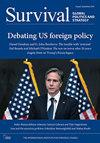新左派能给拉美带来变革吗?
IF 1.9
3区 社会学
Q2 INTERNATIONAL RELATIONS
引用次数: 1
摘要
拉丁美洲2020 - 2022年紧张的选举周期恰逢2019冠状病毒病大流行后社会经济状况恶化,对现状的不满情绪日益加剧。反对现任政府的情绪,加上对更包容、更公平的经济模式的要求,促使该地区出现了明显的左倾,尽管有许多不同程度的“粉红色”。但是,日益分化和分裂的政治和社会环境正在考验新政府带来变革的能力,正如智利民众对新宪法的普遍反对所表明的那样。更为有限的财政空间也限制了这些政府的效率。然而,在减缓全球气候变化和打击毒品贩运方面具有重要利害关系的国家之间的政治结盟可能会产生更有凝聚力的外交政策立场,并增加区域影响力。本文章由计算机程序翻译,如有差异,请以英文原文为准。
Can the New Left Deliver Change in Latin America?
Abstract The intense Latin American electoral cycle of 2020–22 coincided with deteriorating socio-economic conditions in the wake of the COVID-19 pandemic and increasing frustration with the status quo. Anti-incumbent sentiment coupled with demands for more inclusive and fair economic models prompted a pronounced shift to the left in the region, although with many different shades of ‘pink’. But an increasingly polarised and fragmented political and social environment is testing the ability of new governments to deliver change, as shown by the popular rejection of a new constitution in Chile. A more limited fiscal space is also constraining these governments’ effectiveness. Nevertheless, political alignment among countries with important stakes in global climate-change mitigation and thwarting drug trafficking could produce more cohesive foreign-policy stances and increased regional leverage.
求助全文
通过发布文献求助,成功后即可免费获取论文全文。
去求助
来源期刊

Survival
Multiple-
CiteScore
2.10
自引率
16.70%
发文量
88
期刊介绍:
Survival, the Institute"s bi-monthly journal, is a leading forum for analysis and debate of international and strategic affairs. With a diverse range of authors, thoughtful reviews and review essays, Survival is scholarly in depth while vivid, well-written and policy-relevant in approach. Shaped by its editors to be both timely and forward-thinking, the journal encourages writers to challenge conventional wisdom and bring fresh, often controversial, perspectives to bear on the strategic issues of the moment. Survival is essential reading for practitioners, analysts, teachers and followers of international affairs. Each issue also contains Book Reviews of the most important recent publications on international politics and security.
 求助内容:
求助内容: 应助结果提醒方式:
应助结果提醒方式:


